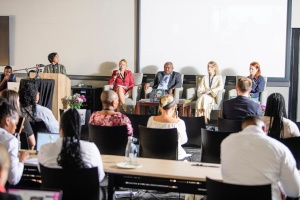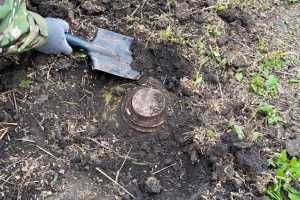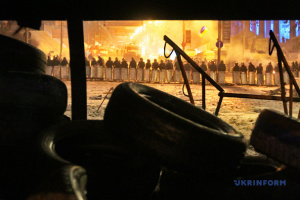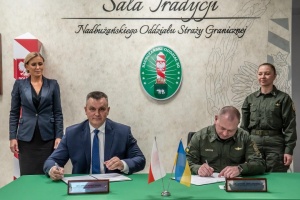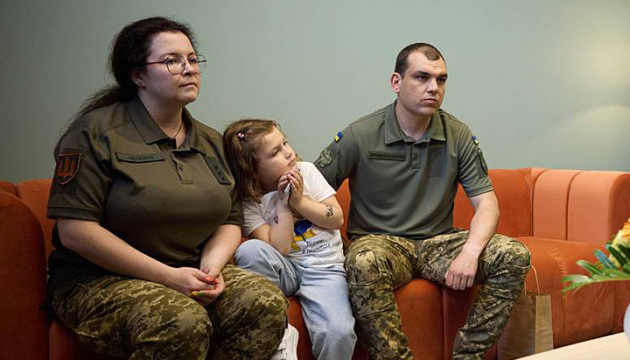
Life Story: Happiness of Two Captives and Little Anna-Mariia
Looking at the photographs made in the past few weeks, one may think that this family – father, mother, and daughter – are too gleeful and carefree for the times of the Russian-Ukrainian war. Nonetheless, these glossy images were preceded by the durable captivity of Kateryna and Ihor, military from Mariupol, while their minor child has spent over a year in the temporarily occupied territory.
The couple has passed a test of Mariupol being destroyed by Russians and months in captivity. These Ukrainians found salvage in Russian captivity in their faith that there was a way out of even the most complicated situations. They lived to hear that happy call and warm hugs.
Ukrinform tells the story of distress and family reunification.
THE CHILD KEEPS ASKING IF SHE WON’T BE ABANDONED AND IF SHE IS LOVED
Today, 6-year-old Anna-Mariia is attending a preschool institution to speed up her preparation for school. She returned to her mom and dad only in May this year. For over a month now, she has kept asking her closest people whether they would not abandon her and if they loved her.
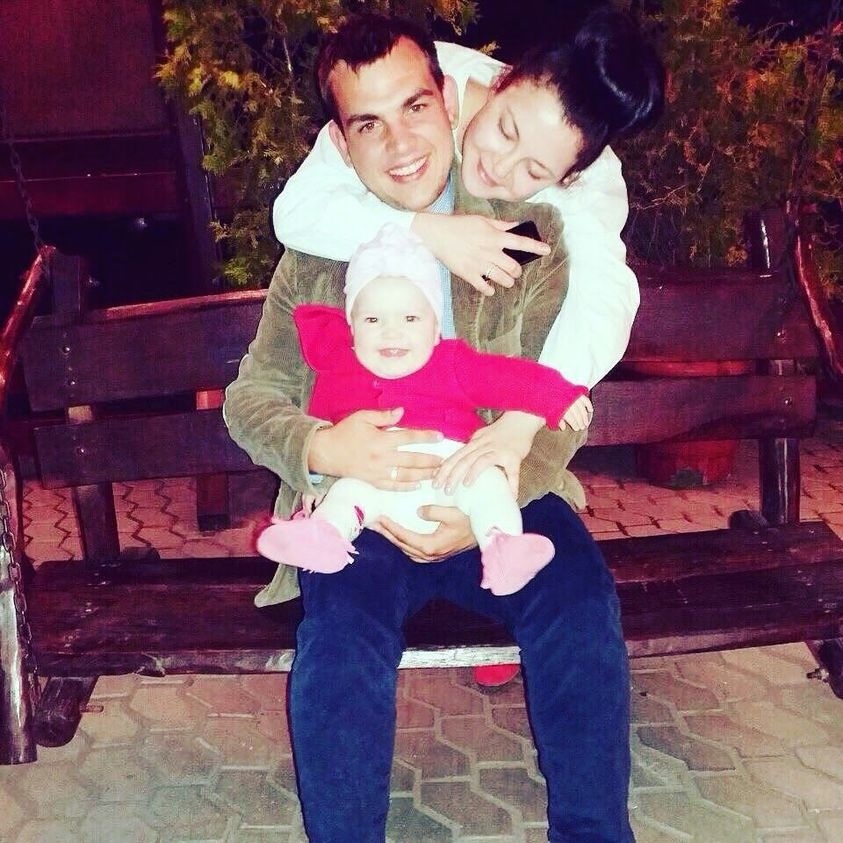
The family lived in Mariupol before the full-scale invasion. Mom – Kateryna Skopina, a lieutenant with two university degrees, used to serve as the Deputy Commander for moral and psychological support at Military Unit A1249. She joined the military back in 2013. Her husband, Ihor Dmytrykovskyi, joined the AFU later and served as a master sailor at the division for technical maintenance of artillery equipment at Military Unit A1275 of the 503rd separate marine infantry battalion. They spent all their spare time with their daughter.
“I did not want to believe there would be war until the last moment,” Kateryna recalls. “Even when Russians were encircling Mariupol, and dozens of injured people were being delivered to the hospitals in the course of 2–3 hours. Until mid-March, I still thought: just a little more, and everything will end. And we will take back Donetsk.”
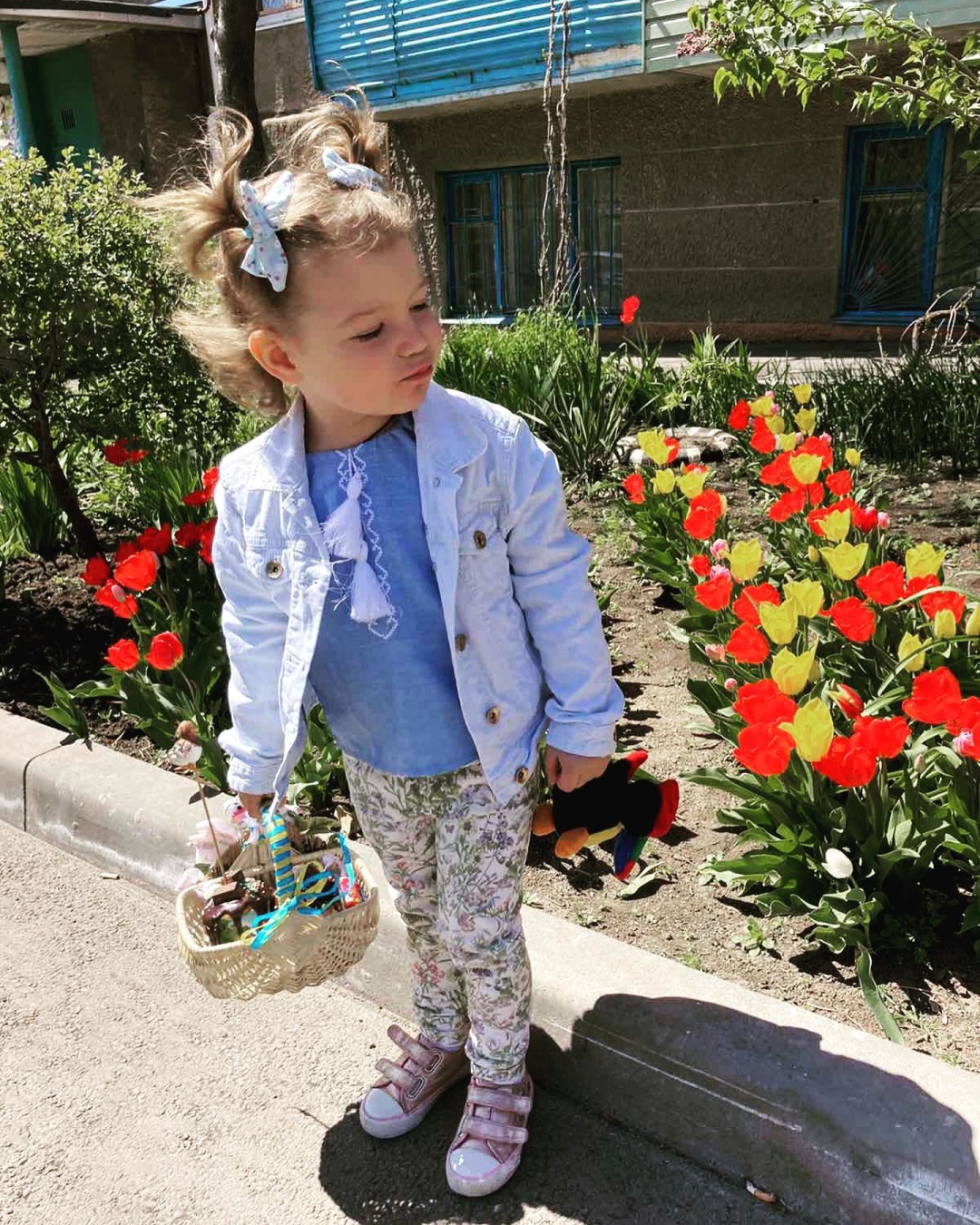
In Pryazovia, the hostilities intensified a bit earlier. After all, the war has been going on since 2014 there. The enemy started shelling the left bank of the Kalmius River before 24 February. In the vicinity of the villages of Liapine, Shyrokyne, Siedove... “On the night of 21 February, when my husband was on 24-hour duty, I was called on duty because of the combat alert,” says Kateryna. “We left the child at home, having called my father-in-law asking him to come. It was still calm; the public transport was on the route. In the morning, Ihor drove his father and our daughter to the village, leaving the car keys there. We agreed that they would take Anna-Mariia to my parents, to Lviv. But soon, my husband’s parents found themselves in occupation with a 5-year-old child.”
It is noticeable that Kateryna does not want to discuss what happened later. And I am not asking. I only know that they started making Russian documents for the girl at the end of last year. Kateryna does not tell what fate awaited her parents-in-law.

...Jumping ahead. The Office of the Ukrainian Parliament Commissioner for Human Rights and the President’s Commissioner for Children’s Rights had to make numerous efforts to return Anna-Mariia during wartime to the territory controlled by Ukraine through third countries. The Russian side did not provide Kateryna with any assurances regarding her daughter’s return until the very end. They put forward a humiliating mandatory condition: Anna-Mariia had to recognise Kateryna at a distance of 150 metres at the checkpoint in the grey zone on the border between Latvia and the RF. And a miracle happened: the child recognised her mom even after all these months of endless stress... She ran towards her right away. Kateryna and Anna-Mariia have not seen each other for one year and three months.
...The family has been together for over a month now. Yet, as a specialist and a mother, Kateryna Skopina says, “Everything is not as good as it seems yet. We have lost that psychological mother-father-child connection we used to have”.
Now, the family is undergoing joint rehabilitation. A psychologist is working with a 6-year-old Anna-Mariia involving the parents. “I think, after everything the specialist is going to hear, he will need psychological assistance too,” says Kateryna. “Few people come across stories of two military and a child who had been left without parents on the temporarily occupied territory for a year.”
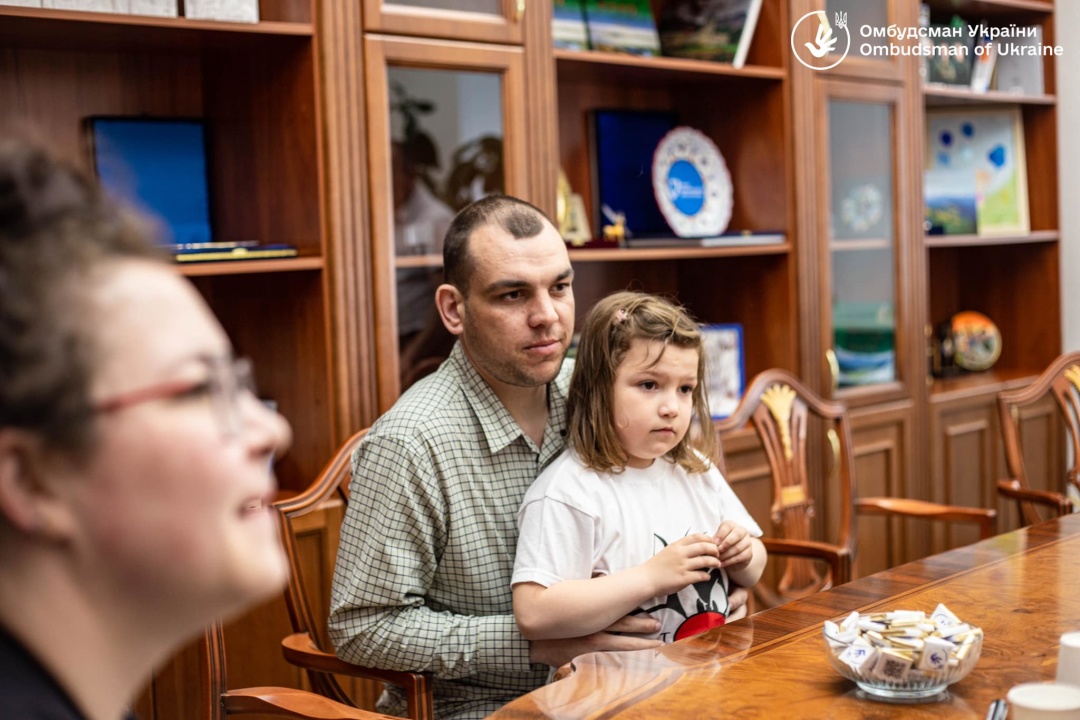
HOW DID THE COUPLE GET INTO CAPTIVITY TOGETHER
Lieutenant Kateryna Skopina was released from a 9-month-long Russian captivity on 6 December 2022. Sixty defenders were returned to Ukraine then, including two women.
The day before, captives were taken from Taganrog in an unknown direction. No one could see the road, but judging from the sounds, they eventually realised they were approaching the airport. Taganrog is close to the Ukrainian border, but this was the route taken. This meant that ahead was either the Russian rigged trial or an exchange. When they switched the plane to a bus, no one told them about their destination either. After spending the night, when they stopped the next day, they could hear some orders given over the radio. Then, the guards with weapons left the bus. After this, a man came saying the words that left no doubts, “Raise your heads, welcome to the homeland! Glory to Ukraine!”
The first person that Kateryna called after her return was her mom. Though the phone number was unknown, she heard, “Is it you, Katia?” on the other end. This was when the woman learned that her Anna-Mariia was not in Lviv. Since then, an endless search and attempts to return her husband and daughter have started. After the new year began, on 27 January, she saw a video with Ihor on Telegram. “In the video, he was sending greetings to us and said he loved me and our daughter, missed us a lot and said that he was ‘fine’. But I could see that his condition was horrendous. Both the psychological and physical,” Kateryna recollects.
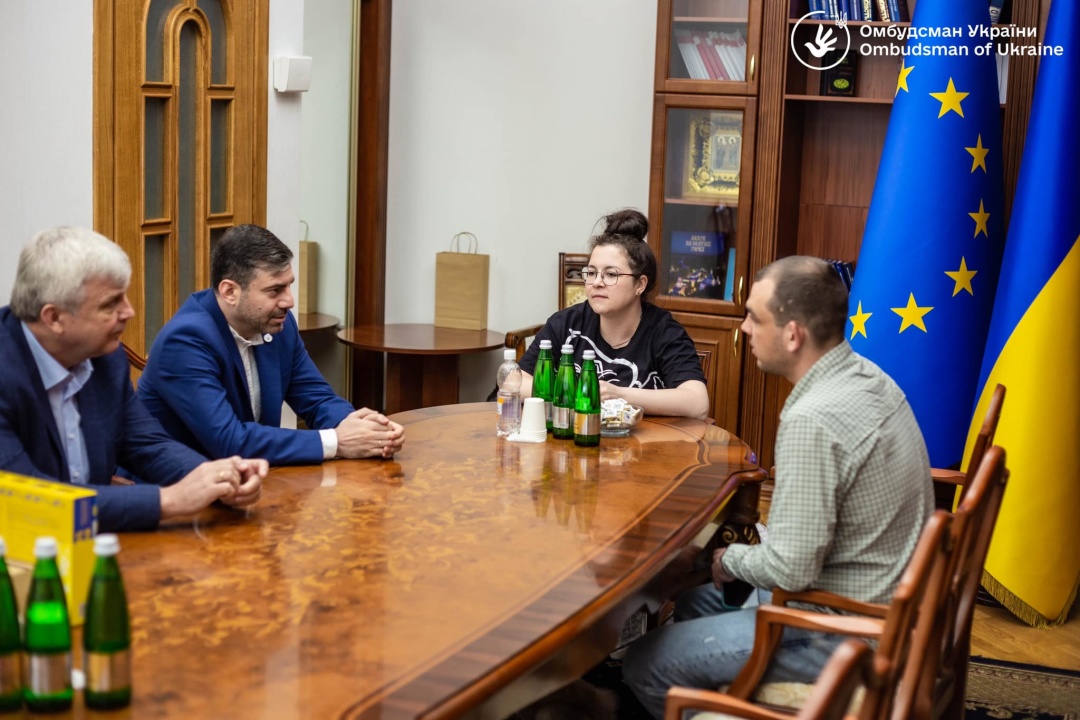
After two months of treatment and rehabilitation, Lieutenant Kateryna Skopina was back on duty in March. She specifically does not mention all the horrors of Russian captivity so that all Ukrainian prisoners of war could be returned home as soon as possible. Nonetheless, what she did say is enough to get an idea of the enemy’s captivity.
On 16 March of last year, a bomb fell on the intensive care unit of the military hospital in Mariupol. Those who managed to survive – 18 personnel members with serious injuries – evacuated to the Illich plant and the same number – to Azovstal. They even managed to take the equipment, medicines, and sustainment with them. A surgery room was set up at a new location. The conditions were anything but easy, they lacked medicines, and doctors slept at intervals of 30 to 40 minutes.

“In early April, we were encircled. If this did not happen, perhaps, we would have been able to somehow evacuate the wounded to Zaporizhia or somewhere nearby,” Kateryna recalls.
There were three breakthrough attempts, but the Russians immediately started bombing the column with the wounded using everything they had: artillery, aviation. They painted the digits “300”, i.e., wounded, with green paint on the white sheet, but this meant nothing to the Russians.
...And then the occupiers came. The enemy does not follow any rules for the treatment of POWs. According to Kateryna Skopina, the healthy male military personnel were taken first. Seriously injured and bedridden wounded followed them. The female military were taken captive the last.
WHILE IN CAPTIVITY, IT IS VITAL NOT TO AGREE TO WHAT YOU ARE COMPELLED
Back in Mariupol, captives were first accommodated in two hangars where they had to sleep on the floor. There were nearly 700 people in one hangar and about 500 more in the other.
“I would lie down near wounded,” Kateryna recalls. “This is when I saw that some prisoners cared only about themselves. A thought raced through my head that we would definitely not survive captivity that way. In Olenivka (dozens of prisoners, Azovstal defenders, were later treacherously killed in the colony there. The crime has not been investigated until now, as the enemy did not admit UN representatives there. – Ed.), there were a total of 82 female prisoners of war. Eleven of us were placed in a cell intended for two people. I could not find one of my subordinates, so I asked about her. They told me not to play the boss because they had already done us a favour by placing us together. It was terrible how they kept us in that colony or prison. There was no sign of observance of the Geneva Convention relative to the treatment of POWs.”

The food was bad or very bad. In Taganrog, where Mariupol captives were sent after Olenivka, they were given soup cooked from potato, carrot and onion peels. It seems like something more or less edible was given in Valuiki of Belgorod Region (which is, by the way, historical lands of Sloboda Ukraine), yet the portions were tiny.
Another problem was basic washing. Ruscists don’t understand that in the 21st century, not everyone agrees to do it in a common shower room under cold water and using laundry soap, which turns your hair into “wires.” But Ukrainians can care for themselves even in such conditions, as far as possible. Despite having long hair, Kateryna Skopina managed not to get lice, which often endlessly bite captives in Russian detention facilities.
It is critical in captivity not to slip into the state when you are forced to say anything the enemy wants to hear in exchange for a cigarette. For instance, about Ukraine. Some agreed and made up anything just not to be touched and tortured. Lieutenant Skopina believes this to be unacceptable for the military, even in captivity.
“I protected the girls because all of them were terrified. And I was scared, too,” says Kateryna. “When I was brought to the cell in Taganrog at night, one of the women showed “be quiet” with gestures and told me to memorise... the Russian anthem because they would ask it in the morning. I refused to do it, I did not need their anthem. Then she showed me, “Are you crazy?” Learn, because...” However, this did not make Kateryna lose her officer dignity – to shout obscenities about her Homeland, Ukrainians, and the President (a telling detail, isn’t it? – Ed.)... “I am an officer. Can you imagine me shouting this while everyone would repeat after me?”
...After the return from captivity, they work with every POW and check them using a lie detector to find out if they were recruited in captivity. Kateryna is not ashamed of herself. There are other female officers that are not to be ashamed of. There are others, too, few of them, but they exist.
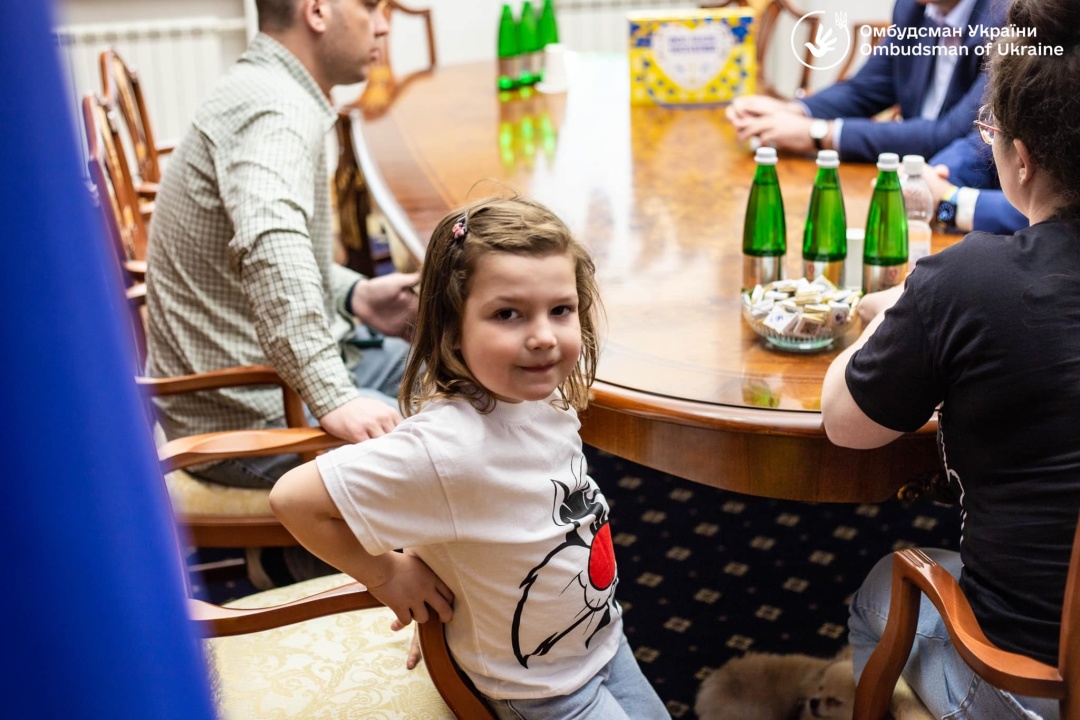
THE ENTIRE TROLLEY BUS CONGRATULATED KATERYNA ON HER HUSBAND’S RETURN
Before the captivity, until 12 April, Kateryna tried to keep in touch with her husband. They even managed to ride the same bus from Mariupol to Olenivka. But already in Taganrog, she heard that her husband was being taken away from there too. But her hopes that he was also going for an exchange were futile. Ihor was taken somewhere deep inside Russia.
Ihor Dmytrykovskyi was returned on 26 April. A woman received a happy call from an unknown number while riding a trolley bus. The voice first clarified, “Kateryna Yevheniivna, where are you?” She started explaining that she would soon be at her workplace. And got a response, “Haven’t you recognised me?..” Kateryna started crying and turned the speakerphone on. Passengers, strangers started hugging her, congratulating her on the return of her loved one...
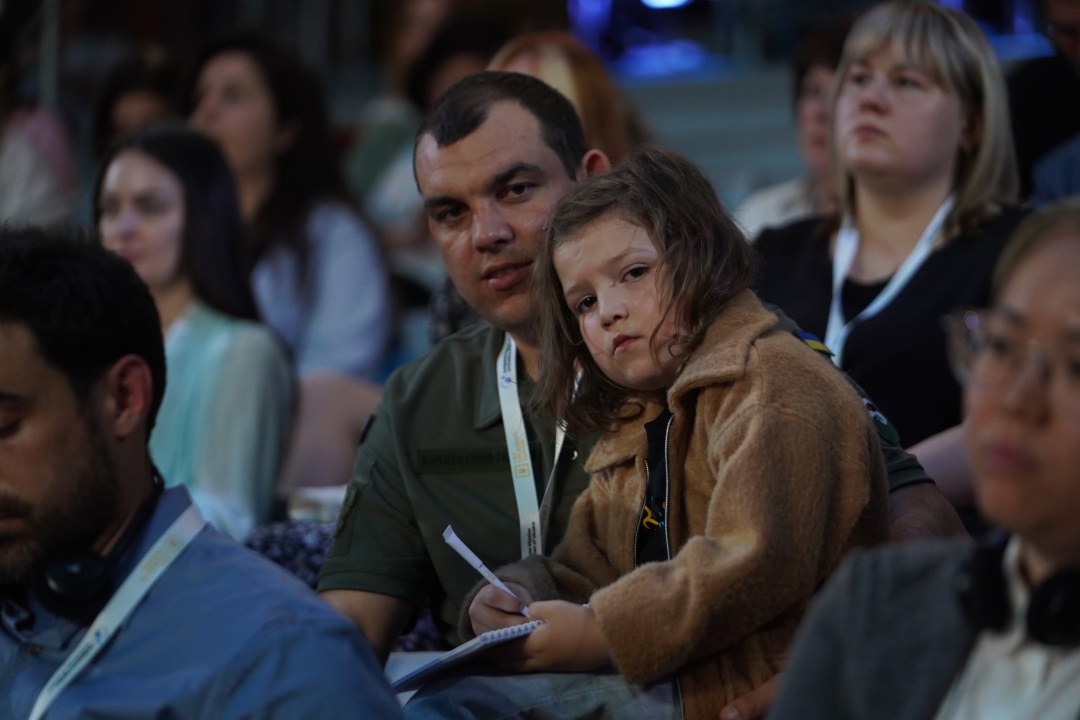
Already the next day, Kateryna brought Ihor a cake to congratulate him on his return and the two birthdays that he spent in captivity. “After all, I am a psychologist, so I was asking my husband if he was ready to see me,” the woman says. “Of course, we talked. But then I realised that in the first days after that experience when the emotions whirl and medical examinations start, a person is not yet ready to become the same person you used to know. Therefore, my advice to psychologists and anyone who finds themselves in a similar situation is that it is best to meet about a week following the return.”
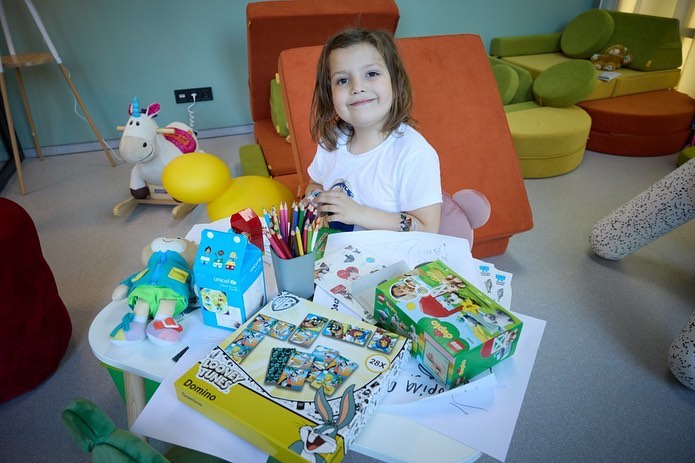
...The family – Kateryna, Ihor, Anna-Mariia – is now building “personal bridges” that Russia tried to break inhumanely. They will still be happy. That is for sure.
Valentyna Samchenko, Kyiv
Photo provided by the family and taken from Dmytro Lubinets’ FB page.

